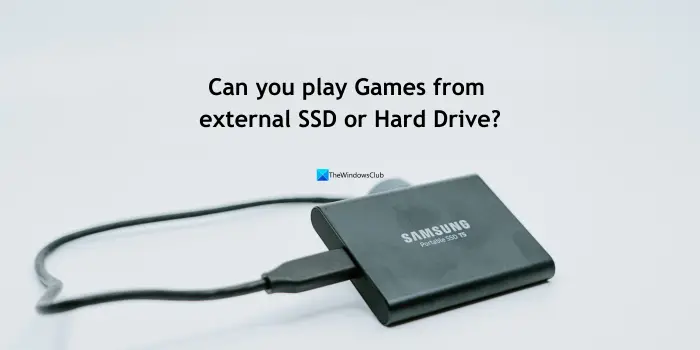The demand for storage space has never been the same. In today’s world, graphics are immersive with expansive worlds that require a lot of storage space to even store the game files we play. Gaming libraries have a long list of data-intensive titles that cannot be saved on the internal SSD or hard drives. You need to opt for external drives. There arises the doubt if you can play games from an external SSD or Hard Drive. In this guide, we explain if you can play games from external drives and what impact will it have on the games.

Can you play Games from external SSD or Hard Drive?
Yes, we can play games from an external SSD and hard drive. The difference between SSD and HDD hard drives are their speeds in storing and reading the data. SSDs are slightly costs more than HDDs and their performance differs. It is normal for us to think of playing games through an external drive due to the demanding storage space that game files require.
To be able to play games from an external SSD or hard drive, you need to be careful while installing the games. You need to select the external drive as the installation location during the installation. The game files such as backups, should also be stored on the external drive to play without any issues. You can tweak these while installing or in the game settings. By storing your games and the necessary data on external drives, you can just connect the drive to any computer and play games if the PC is compatible with running them. Just be careful about data protection and corruption while you connect to multiple PCs.
Though you can play games from both external SSDs and HDDs, it is better to opt for SSDs for heavy games. SSDs help you have smoother gameplay, and improved graphics because of their speed and capabilities when connected to a compatible PC. HDD on the other hand is not that worthy if you want to play heavy games like Halo as they are limited in their speeds. HDDs are available for a cheaper price but the performance will not be as good as an SSD.
Things to consider while playing games from an external drive
Before you choose to install and play games from an external drive, you need to consider the following things.
Format in the same file system: Make sure the external drive is formatted in the same file system as your PC to be compatible. It will be NTFS for Windows, HFS+ for Mac, or exFAT for cross-platform compatibility. It has to be the same even if you are playing on a gaming console.
Choose a trusted gaming platform: Most game distribution platforms like Steam allow users to install games on external drives and play them. Make sure the platform you choose allows installation on external drives. Even the game consoles like Xbox and PlayStation support external storage for games.
Load times and performance: The time it takes to load a game can make a big difference. SSDs usually take less time than HDDs. USB connection with USB 3.0 or later plays a significant role in improving the load times.
Connections: The connection of external drives with your PC or gaming consoles should not be disturbed while playing games. You need to make space for the external drives where the connections would be safer. Choose cables from trusted brands to be able to play games without any issues.
Also read: How to tell if the Hard Drive is SSD or HDD in Windows
Is it OK to play games on external SSD?
Yes, it is okay to play games from an external SSD provided you have all the games files on it, have a reliable connection with the console or PC, and your PC is equipped enough to large games. It won’t be as good as playing from an internal SSD, but you can eliminate storage constraints by playing games on an external SSD.
Is it better to play games on SSD or HDD?
SSDs are better for gaming or any other task in today’s fast-paced world. HDDs cannot match the speeds SSDs can give to the users. Games load faster if they are installed on an SSD rather than an HDD and there will be significant differences in terms of performance between them.
Related read: How to move Steam Games to another Drive in Windows.
Leave a Reply